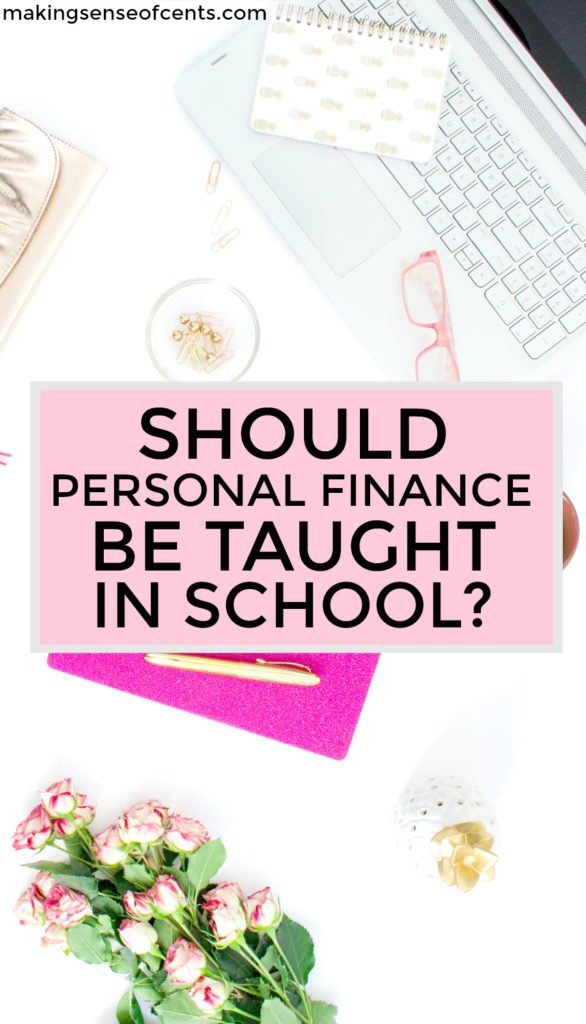 While I can’t guarantee that I would have paid super close attention to a personal finance education class if I had taken it, I’m sure it would have been a better use of my time than some of the other classes that were required when I was in school.
While I can’t guarantee that I would have paid super close attention to a personal finance education class if I had taken it, I’m sure it would have been a better use of my time than some of the other classes that were required when I was in school.
Note: Yes, I use the Pythagorean theorem all the time in my day to day life… Just kidding!
Don’t get me wrong, what is currently taught in school is great and all, but adding personal finance into the curriculum would be a great way to give kids a good foundation that could impact their lives well into the future. While many people leave school not really remembering everything, just a background of personal finance could greatly improve a person’s life.
Personal finance was not a required class when I was in high school, but I sure wish it was. Now, more schools are starting to make personal finance education a required class, but I believe this needs to be a requirement for every student, as personal finance can greatly shape and change your life.
After all, the majority of people don’t even have a basic understanding of personal finance and/or their financial situation. While there are many great classes that are required in school, I believe that personal finance should be equally important.
As I brought up in the post Are You Better Than Average?:
- 68% of people live paycheck to paycheck.
- 26% have no emergency savings.
- The median amount saved for retirement is less than $60,000.
- The average household has $7,283 in credit card debt.
- The average student loan debt is $32,264.
I believe that if there was more of a focus on personal finance education, then more people would be doing better financially.
But shouldn’t parents teach their kids personal finance education?
This is one of the leading things I hear about NOT offering or requiring a personal finance class. However, I don’t agree with it.
Considering that many people, both young and old, are already bad with money, are they really the best teachers for their children?
Plus, not everyone has a family that is able to teach them. These children shouldn’t just be left in the cold.
If school is really meant to prepare the next generation for the real world, requiring personal finance education only makes sense!
With all of that said, today’s post will include the most important personal finance topics that should be taught. Whether in school or not, these are things that everyone should know.
How credit cards and loans work.
Many people do not truly understand credit cards and loans, and this is why there are so many credit card and loan myths floating around.
Credit card myths I’ve heard include:
- You have plenty of time to pay off debt, so you should only pay the minimum payment. FALSE! The truth is that you should pay more than the minimum payment if you have an interest rate because it will add up quickly!
- You have to pay the interest rate on a credit card, no matter what. FALSE! The truth is that if you pay your balance in full each month, then you don’t have to pay credit card interest. So, you should definitely pay it off each month!
- Credit cards are another form of income. FALSE! The truth is that if you treat your credit card as income, then you’ll most likely fall into a lot of credit card debt.
- You should carry a balance on a credit card because it helps your credit score. FALSE! There are so many ways to improve your credit score, so you should not be paying interest just to do so. I have a credit score of over 800 and I’ve never once carried a balance on a credit card.
Children, students, adults, EVERYONE, should know how credit cards, loans, interest rates, and more work.
By knowing these things, a person may be less likely to have debt because they won’t be falling for any ridiculous myths. Being well informed on how credit cards work is one of the best ways to make sure you don’t fall into credit card debt, and there are so many people that fall into credit card debt early on because they were never taught how to use them properly.
How to write a check.
Surprisingly, many people have no clue how to write a check. While writing a check isn’t as needed in today’s world, there are still moments when knowing how to write a check would be extremely beneficial.
Situations in which you may need to write a check include:
- Some companies will charge an extra fee if you pay by credit card. This may apply to payments for tuition, tax payments, deposits, and so on. In these cases, writing a check can actually save you money!
- When giving a gift to someone.
- When RVing. If you RV, there are many times in which the campground will only take cash or check. Writing checks can make it much easier to travel because you may not always be near an ATM.
- Paying rent.
Plus, it’s so easy to write a check, so why not just learn?
If you want to learn how to write a check, I recommend reading 6 Simple Steps That Will Teach You How To Write A Check.
How to manage a budget.
I believe that everyone needs some form of budget- whether that means writing down exactly what you are spending or just being mindful of your spending.
While budgets may not be glamorous, everyone should know how to properly create and manage one.
Different things work for different people, but the key things to know are:
- How much money you’re bringing in.
- How much you’re spending.
- Whether or not you are being wasteful.
Knowing how to manage a budget, even at a young age, is important because a budget can keep you mindful of your income and expenses. By having a budget, a person knows exactly how much they can spend in a category each month, how much they have to work with, what spending areas they need to work on, and so on.
A budget can help you to reach your goals, pay off debt, make more money, retire, reach financial freedom, and more.
Learn more at The Complete Budgeting Guide: How To Create A Budget That Works.
The importance of an emergency fund.
Younger people like to think that they are invincible. We’ve all been young and know this feeling. Many young people may not think that they need an emergency fund, but pretty much everyone needs one eventually.
An emergency fund is something I believe everyone should have. However, 26% of Americans have no emergency fund whatsoever.
Emergency funds are important because:
- An emergency fund can help you if you lose your job. No matter how stable you think your job is, there is always a chance that something could happen where you may need money fast. What would you do if you lost your job and didn’t have an emergency fund?
- An emergency fund is wise if you do not have great health insurance. This is another reason why we have a well-funded emergency fund. We do not have the greatest health insurance- our deductible is over $12,000 annually. Having an emergency fund can help protect us if something were to happen.
- An emergency fund is a good idea if you have a car. You just never know when it will need a repair.
- An emergency fund is a need if you own a home. One of the lucky things that homeowners often get to deal with is an unexpected home repair. Having an emergency fund can help you if your basement floods, if a hole forms in your roof, and more.
Emergency funds are always good to have because they can give you peace of mind if anything costly were to happen in your life. Instead of building onto your stress you will know you can afford to pay your bills and worry about other important events that may be currently happening in your life. I think there are many people that wish they could have been taught the importance of an emergency fund early on. Emergencies don’t just happen to those with families and full-time jobs. They are a must for all!
The steps to invest.
The last of the extremely important personal finance lessons that I believe should be taught in school includes how to invest your money.
You want to invest so that you can:
- Retire one day.
- Prepare for the future.
- Allow your money to grow over time.
Many people are afraid to invest their money, and I believe it’s because they were never once taught or told about how important it is to invest. Many people probably don’t even know how to take the first step to investing their money.
If people are never taught those two very basic things, then they may never invest!
Investing is important because it means you are making your money work for you. If you weren’t investing, your money would just be sitting there and not earning a thing.
This is important to note because $100 today will not be worth $100 in the future if you just let it sit under a mattress or in a checking account. However, if you invest, then you can actually turn your $100 into something more.
For example: If you put $1,000 into a retirement account that has an annual 8% return, 40 years later that would turn into $21,724. If you started with that same $1,000 and put an extra $1,000 in it for the next 40 years at an annual 8% return, that would then turn into $301,505. If you started with $10,000 and put an extra $10,000 in it for the next 40 years at an annual 8% return, that would then turn into $3,015,055.
Learn how to invest at The 6 Steps To Take To Invest Your First Dollar – Yes, It’s Really This Easy!
Do you believe that there should be more of a focus on personal finance education while in school? Why or why not? What other topics do you think should be covered?


Leave a Reply